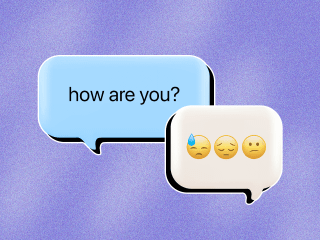How to Deal With Losing a Parent
According to therapists who specialize in grief and know what it’s like.
Losing anyone you care about is hard to grapple with, but losing a parent is a uniquely difficult—and often life-altering—experience. For many of us, our parents shaped us and how we view the world in hugely impactful ways, says licensed psychologist Mekel Harris, PhD, CAGCS, author of Relaxing Into the Pain: My Journey Into Grief & Beyond. You might also be losing someone you relied on for advice, safety, and (at one point or another) financial support, which can feel lonely, scary, and destabilizing, says grief and trauma therapist Katherine Hatch, LCSW.
Even if you didn’t have the greatest relationship with them, losing a parent can hurt like hell. You might feel angry, sad, and a ton of regret that you weren’t able to fix things before they died, says Dr. Harris. And, depending on the situation, you might even be a bit relieved, especially if your parent was suffering or if you experienced caregiver burnout from supporting them, Dr. Harris notes.
But, overwhelmingly, you’re likely experiencing grief. And that’s some heavy stuff to work through. If you’re dealing with this type of loss, here are therapist-backed tips to move through your grief, give yourself grace, and feel connected (if you want to) after your parent has passed away.
Really let yourself feel the grief.
You might feel like you need to rush through your emotions or avoid them altogether, says Dr. Harris. Aside from the stigma associated with grief in our society, we basically live in a “Band-Aid, quick fix world,” where we want to get rid of any sort of pain, she explains. But that’s not how grief works.
Rather than bypassing your grief, acknowledging it and expressing whatever emotions come along for the ride will help you move through it, Dr. Harris notes. To do this, lean into what seems best for you. You can talk about your feelings with friends, a support group, or a mental health professional, Dr. Harris suggests. You can also look for ways to externalize what you’re feeling by journaling, making art, or channeling it through movement (walking, Pilates, yoga…whatever), she says.
Look for ways to keep your connection with them.
Being able to honor your parent who passed, or continue your relationship with them in some way, can help mitigate the pain and help with healing, says Hatch. “It provides an opportunity for the person who has survived to remain connected in a living and breathing way,” Dr. Harris agrees. “If their name is never brought up, it's almost as if they never lived. So talking about the person, doing things to celebrate them [even] years beyond the loss, can keep their spirit alive."
For Dr. Harris, this looks like ordering food from her late mom’s favorite restaurant on her birthday and getting together with family on the anniversary of her dad’s death. But the experts say you can foster this connection outside of major events too. On a random Tuesday, you can write to them (whether that’s with life updates or expressing what you wish you could say), read their go-to books, visit their grave, wear their clothes, listen to music they liked, continue a hobby they enjoyed, or go on a walk with a picture of them in your pocket. Dr. Harris will even record voice memos for her parents when she wants to tell them something, for example.
Tap into something that gives you perspective.
This isn’t about ignoring your grief. Doing things that remind you of life outside of your pain can give you some hope that there is a world beyond it. For Dr. Harris, that meant talking to a higher power and praying—but it doesn’t have to be religious if that’s not what you’re into. Just connecting with nature, which cycles through things in a very visible way, can help you see that you can cycle through seasons and feelings too, she says.
“When my mom died, prayer was something that I really dove into as a connection point to her and God, but I also picked up gardening, which I had never done. … I was helping plant seeds to grow life, and it was very symbolic that life could continue beyond a loss,” Dr. Harris explains.
If nature isn’t your thing, perspective may come in the form of helping others when you’re ready. For Dr. Harris, providing therapy for grieving people has been a consistent act of service, though you don’t have to make a massive career change or anything. You can always donate to organizations that your parent cared about or volunteer in your community, she says.
Give yourself grace.
It’s easy to judge yourself if you feel like your pain is lasting too long or you’re not grieving the way other people seem to be. But everybody grieves differently—there is no right or wrong way to do so when a parent (or anyone else) dies. This is an especially helpful reminder if you had a weird or nonexistent relationship with your parent—don’t shame yourself for having conflicting feelings about their death, notes Dr. Harris.
Instead of judging, just notice the emotions that come up and how they feel in your mind and your body, says Hatch. Then, like we talked about earlier, let yourself move through those emotions in whatever way makes sense to you. It’s a good practice in self-compassion, she says.
When Hatch’s dad died, giving herself grace meant mourning privately instead of publicly like some of her siblings. “We all had very different relationships with my dad, and so that is why we grieved in different ways and why we continue to do so,” she explains. “Instead of feeling badly about that or judging … I've just given myself a lot of space to do it differently.”
And remember that grief isn’t linear and it’s normal for it to come in waves, says Hatch. But you may not be able to see some of these waves approaching. For the situations you can’t plan for—a sign that reminds you of your mom, a song that brings back memories of your dad—let your emotions flow, says Dr. Harris. For her, seeing the laundry detergent that her mom used during a Costco trip triggered a ton of tears. “[If that happens to you,] allow yourself to emote or experience whatever is rising up, knowing that nothing's wrong with you,” Dr. Harris says.
“Allowing those tears to fall in Costco in front of strangers was actually one of the best things I could do.”
Wondermind does not provide medical advice, diagnosis, or treatment. Any information published on this website or by this brand is not intended as a replacement for medical advice. Always consult a qualified health or mental health professional with any questions or concerns about your mental health.




